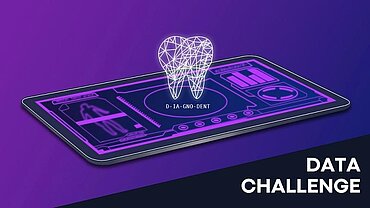D-IA-GNO-DENT, a challenge to use AI to diagnose rare oral diseases
University Hospitals of Strasbourg (HUS) with the Reference Center for Rare Oral and Dental Diseases and the IGBMC (CNRS, Inserm, University of Strasbourg) are launching the D-IA-GNO-DENT Data Challenge on April 3, 2023. The challenge is organized in collaboration with the Rare Disease Foundation, the Health Data Hub, the Health Factory and the Collège National des EnseignantS en Biologie Orale (CNESBO). The objective of the participants is to produce a program capable of visually detecting genetic alterations of the dental enamel in only 3 months to improve the orientation and the management of people suffering from rare diseases.
The project benefits from financial support obtained within the framework of the Digital Health Acceleration Strategy of the Ministerial Delegation for Digital Health. This financial support is operated by Bpifrance.

A virtual expertise program in oral health to move from wandering to a diagnosis process
Directed by Agnès Bloch-Zupan, university professor - hospital practician at the University of Strasbourg and the HUS, coordinator of the Reference Center for Rare Oral and Dental Diseases, CRMR O-RARES, and researcher at the IGBMC, the D-IA-GNO-DENT challenge gives participants access to a secure platform containing dental photographs and radiographs of patients. From these images, participants must develop an algorithm capable of identifying structural defects on the enamel surface. A major challenge: the number of people suffering from rare diseases being limited, they will have to work with a restricted number of data.
However, this is not an impossible challenge! The IGBMC teams, in partnership with Capgemini and e-media, have already succeeded in developing a powerful algorithm to help diagnose rare diseases with missing teeth . This virtual expert will eventually help health professionals to direct the people concerned to specialized centers.
At the end of the challenge, the jury will select 3 winners based on the performance, robustness, reliability and repeatability of their algorithm. The solutions developed by the candidates must also be able to communicate and be integrated into the virtual expert. The first winner will receive a 20 000 € award, the second and third will receive 5 000 €.
To participate and work with anonymized data, participants must sign an ethical charter and fill out this form. To register, click here.
Teeth, a marker of developmental disorders
Tooth development begins in the 6th embryonic week and stops between the ages of 18 and 25. The genes that allow the tooth to form are the same as those involved in the formation of the body. These developmental disorders can be made visible because the mineralization of the hard tissue of the tooth will fix these abnormalities. Performing an oral analysis can thus point to the causal agent.
